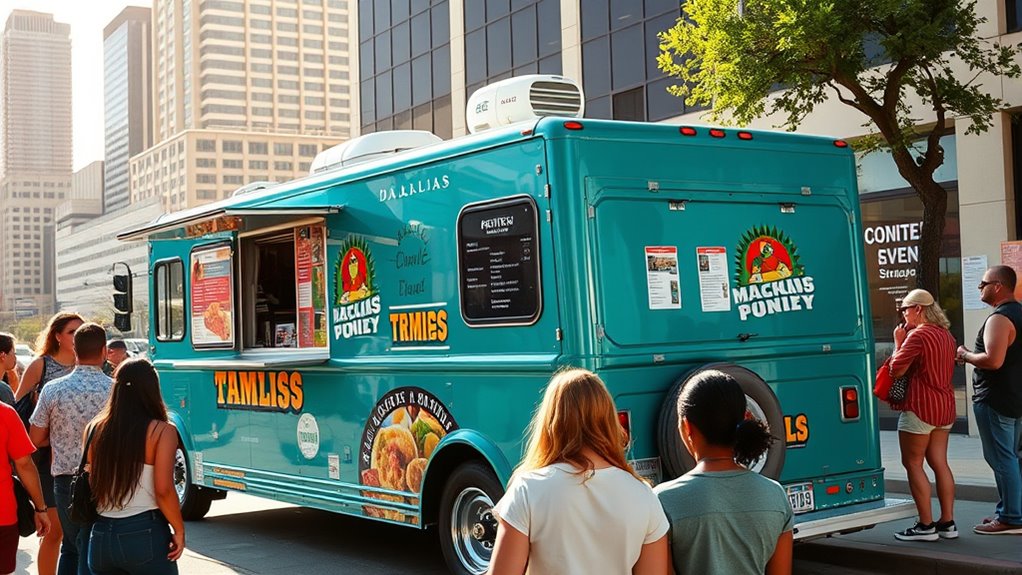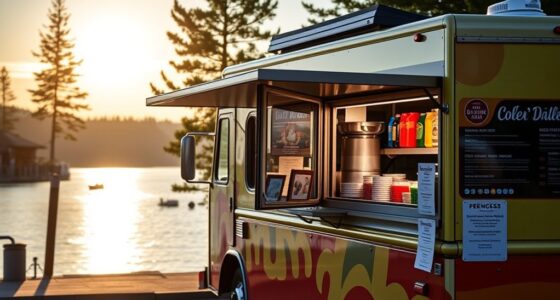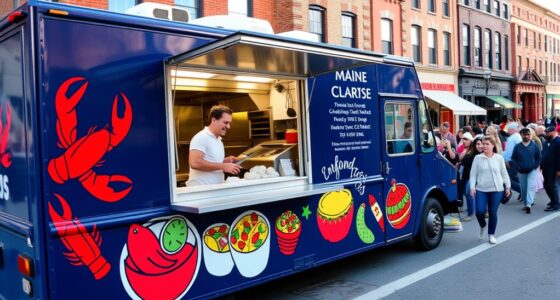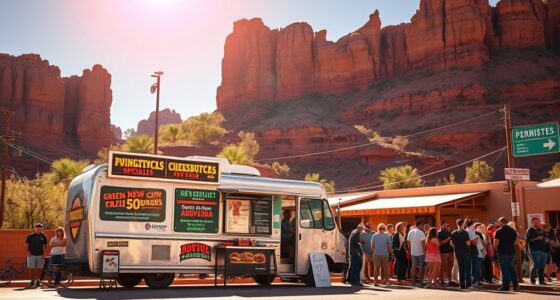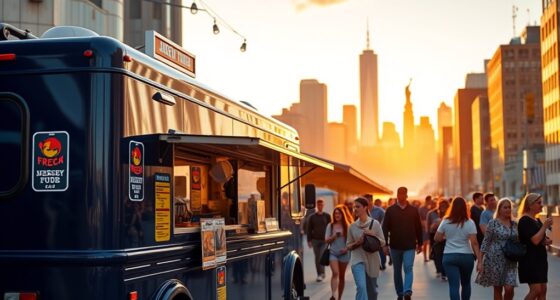To start your food truck in Dallas, you’ll need permits like the Mobile Food Establishment Permit, which costs around $1,000 for 9 months, and guarantee your vehicle meets health and safety standards. Plan your locations carefully to avoid residential zones and secure property permissions. Budget $50,000 to $175,000 for your truck and $5,000 to $20,000 for equipment. Successful marketing and strong branding will help you stand out. If you keep going, you’ll learn how to navigate every step smoothly.
Key Takeaways
- Obtain necessary permits from Dallas, including mobile food establishment and health permits, and schedule inspections through Dallas County health services.
- Budget $50–$1,350 annually for permits, with vehicle costs ranging from $25,000 to over $175,000, plus equipment expenses.
- Choose approved parking surfaces on private property or designated areas, and submit a vending itinerary compliant with Dallas zoning laws.
- Develop a menu suitable for your equipment, ensure food safety practices, and maintain sanitation standards with proper plumbing and waste disposal.
- Invest in marketing through social media, community events, and branding, with initial budgets between $2,700 and $7,200 to build visibility.
Navigating the Permitting Process in Dallas
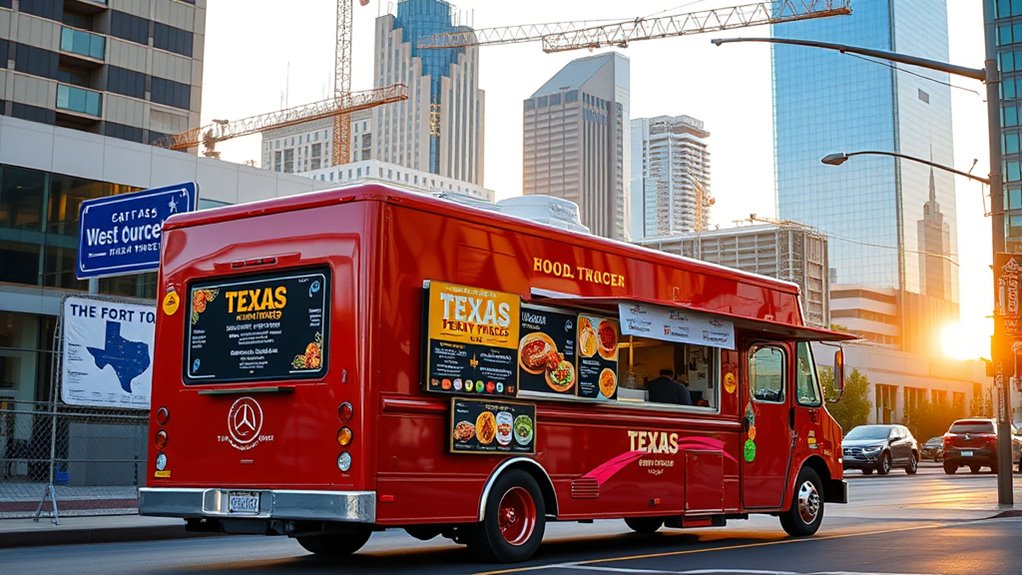
Guiding the permitting process in Dallas requires you to understand and complete several key steps before operating your food truck. First, you must obtain a Mobile Food Establishment Permit from the City of Dallas, which involves providing a vehicle inspection report and waste disposal plan during your application. The permit is valid for 180 days, so you need to pass a health inspection within that period or reapply. All staff involved in food prep must hold a Texas Food Handler’s Permit, and a Registered Food Service Manager must be present during operations. Inspections at Dallas County Health and Human Services are by appointment only—schedule through their office. Ensure your truck complies with zoning laws, parking rules, and maintain operational documentation, including daily itineraries and property owner permissions. Staying compliant with local regulations is essential to avoid fines or shutdowns and ensures your business runs smoothly. Additionally, understanding permit renewal processes and staying updated on any regulatory changes can help maintain your legal standing and prevent disruptions to your food truck operations.
Understanding the Financial Investment for Your Food Truck Business
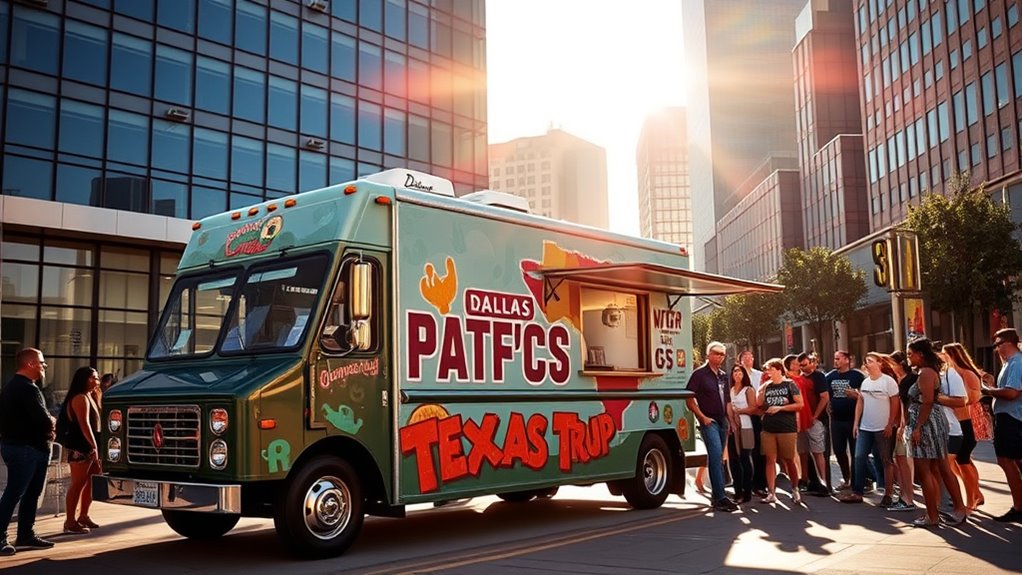
Starting your food truck business requires a clear understanding of the costs involved, from permits and licenses to equipment and vehicle expenses. You’ll also need to budget for operational costs and marketing to attract customers and grow your brand. You are trained on data up to October 2023. Knowing the local regulations and permit fees in Dallas helps you plan your budget accurately and avoid unexpected expenses, ensuring a smoother launch and ongoing success for your venture. Additionally, researching best locations for food trucks in Dallas can significantly impact your customer flow and profitability.
Permits and Licensing Costs
Understanding the costs associated with permits and licensing is essential for budgeting your food truck business in Dallas. The Mobile Food Truck Concession Permit costs $1,000 for nine months and is issued by the City of Dallas Park and Recreation Department. You’ll also need a Consumer Health Permit, which covers food and drinks, after your menu and facilities are reviewed. A business license, typically between $50 and $400, is required to operate legally. The Mobile Food Vendor Permit, managed by health departments, ranges from $100 to over $1,000 annually. Dallas County requires Mobile Food Unit permits, effective from September 2023. Overall, licensing and permit costs in Dallas typically fall between $450 and $1,350 per year, not including additional expenses like insurance and commissary rentals.
Equipment and Vehicle Expenses
Investing in the right vehicle and equipment is essential for launching a successful food truck business in Dallas. Your costs will vary based on whether you choose a new or used truck, trailer, or leasing option. New trucks range from $50,000 to $175,000, while used trucks are typically $25,000 to $75,000, but may require additional maintenance. Trailers start around $27,000 and can be a lower-cost alternative. Equipment costs depend on your menu, with basic kitchen gear costing $5,000 to $20,000, plus $1,000 to $10,000 for extras like generators and POS systems. Custom outfitting, such as stainless steel fixtures, propane, and electrical systems, substantially impacts your budget. Renting food trucks for events in Dallas can be a cost-effective way to test the market or promote your brand without a large upfront investment. Additionally, understanding vehicle maintenance and compliance requirements is vital to keep your business operational and compliant with local regulations. 1. Vehicle purchase or lease options 2. Kitchen equipment and appliances 3. Custom outfitting and modifications
Operating and Marketing Fees
Managing the costs associated with operating and marketing your food truck in Dallas is essential for maintaining profitability. Your initial marketing budget can range from $2,700 to $7,200 for branding, advertising, and digital campaigns. Ongoing expenses include social media ads, community event participation, and occasional promotional boosts. Dallas’s diverse food scene and active event calendar mean that staying visible requires consistent marketing efforts and strategic budgeting. Additionally, leveraging efficient general ledger coding can help track these expenditures more accurately and identify areas for cost savings.
| Operating & Marketing Fees | Estimated Cost |
|---|---|
| Initial Marketing Budget | $2,700 – $7,200 |
| Event Permits | $100 – $300 per event |
| Insurance (annual) | $1,800 – $3,600 |
| POS & Payment Fees | $1,000 – $10,000 upfront |
| Promotional & Influencer | Varies, $40+ per event |
These expenses are crucial for visibility, compliance, and smooth operations, ensuring your food truck stays competitive and profitable.
Complying With Zoning and Parking Regulations
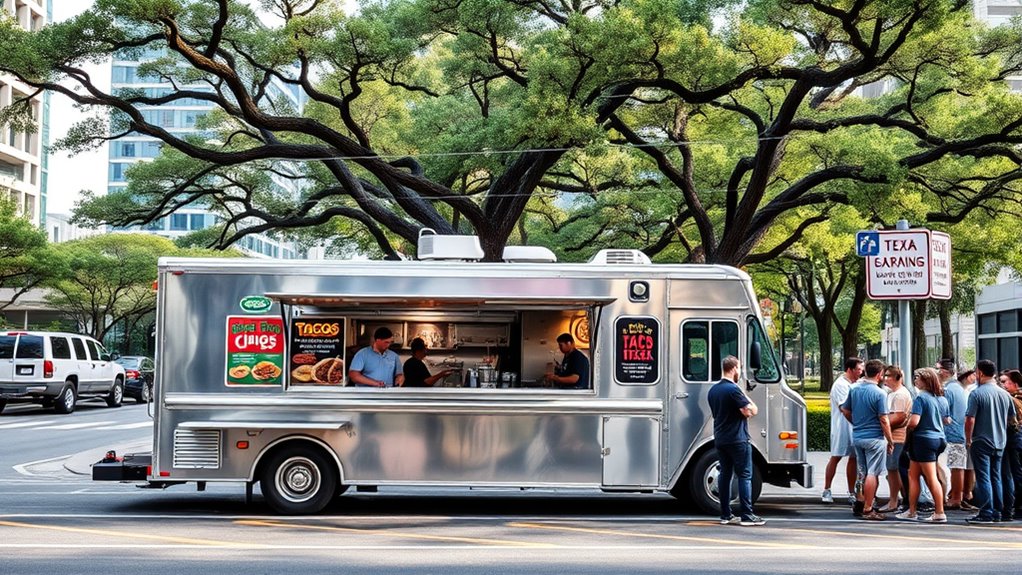
You need to make certain your food truck is parked on approved surfaces like pavement or other hard, level ground. Parking on dirt, grass, or unapproved terrain is not allowed and can lead to violations. Also, always get written permission from property owners before vending on private property to stay compliant.
Parking Surface Requirements
To comply with Dallas regulations, food trucks must park exclusively on improved, hard surfaces such as asphalt or concrete, which meet city code standards. Parking on dirt, grass, or unpaved areas is strictly prohibited, as these surfaces don’t support safe operations or meet health and safety codes. The parking surface must support the weight of your mobile unit and allow safe customer access. Additionally, your truck cannot use off-street parking spaces required by the property where you’re operating. Properly maintained surfaces ensure compliance with local safety requirements. Ensure your parking surface:
- Meets city code standards for durability and safety.
- Supports emergency access and safe egress during inspections.
- Is compliant with zoning restrictions, especially in non-commercial or residential zones.
- Parking surface quality is essential for maintaining a compliant and accessible food truck operation.
Private Property Permissions
Securing proper permission from private property owners is essential for legal and smooth food truck operations in Dallas. You must obtain and maintain a written agreement with the property owner or manager, granting vending rights on the site. This permission should include access to restroom facilities for your employees, complying with health regulations. You’re required to include the property owner’s name, address, and phone number on your vending itinerary, which must be submitted to health authorities with updates as needed. Additionally, ensure your location complies with Dallas zoning laws, avoiding residential zones or areas with restrictions. You are prohibited from parking off-street in primary parking spaces or overnight on private property unless approved. All operations must stay within the mobile unit, respecting signage and noise regulations to prevent violations. Proper documentation is crucial to avoid potential legal issues. Incorporating AI-powered location analysis can help identify compliant sites and optimize your placement strategy.
Vehicle Standards and Equipment Requirements
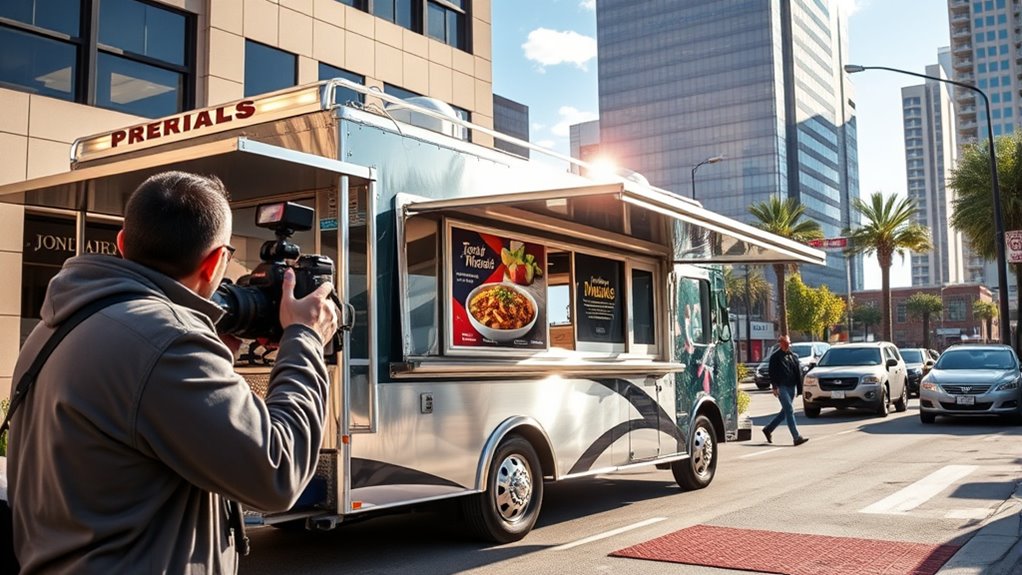
Ensuring your food truck meets vehicle standards and equipment requirements is essential for health compliance and efficient operation. Proper construction and interior standards guarantee sanitation and safety.
- Construction and Interior: Walls and ceilings must be smooth, easily cleanable, and light-colored. Doors and windows need tight seals, and sealants or welds in food contact areas must be approved and smooth. Floors should have equipment sealed or elevated at least 4-6 inches. Aisle space must be at least 30 inches wide for staff movement. Regular inspections ensure ongoing compliance with these standards.
- Equipment: Use NSF-approved appliances, including commercial-grade cooking equipment with proper ventilation and fire suppression systems. Refrigeration must keep foods at 41°F or below, with ample counter space for food prep.
- Sanitation & Plumbing: Install handwashing and three-compartment sinks with proper drainage. Wastewater tanks require adequate capacity and connection to a commissary for waste disposal. [All plumbing components must be installed according to local health codes to prevent contamination.
Developing a Safe and Appealing Menu
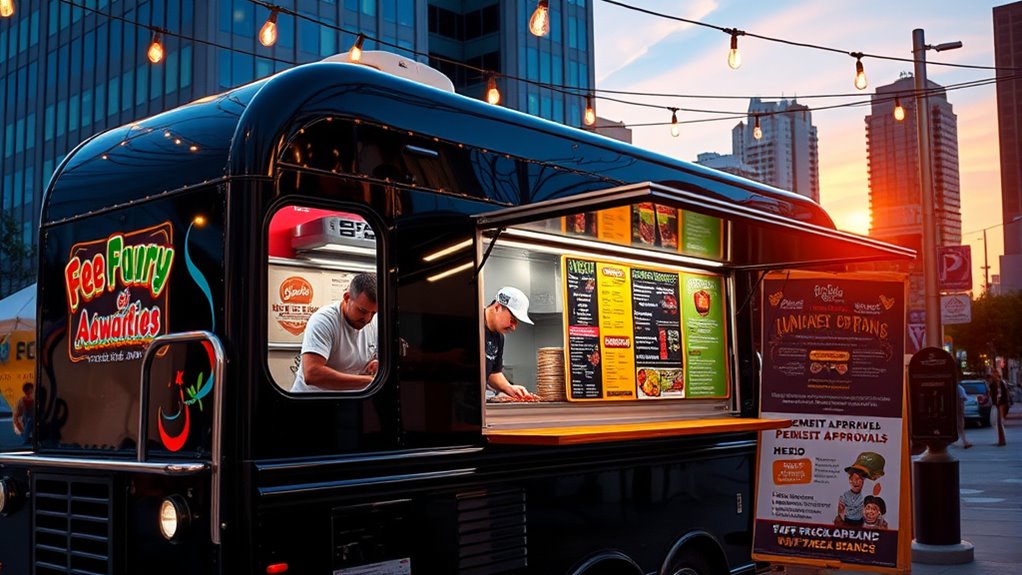
Developing a safe and appealing menu starts with selecting items that fit your food truck’s equipment and operational capabilities. Focus on dishes that can be stored, cooked, and held at safe temperatures—keeping cold foods at 41°F or below and hot foods at 135°F or above. Avoid complex recipes requiring multiple TCS steps, which increase contamination risks. Consider serving pre-packaged or cold-hold salads to minimize prep and handling. Use equipment with lids, like barbecue grills, with barriers to prevent public contamination and grease discharge. Guarantee ingredient sourcing is from approved suppliers, and manage storage carefully to prevent cross-contamination. Daily inventory checks and proper rotation help keep ingredients fresh and safe. Remember, employee hygiene and access to sanitation stations are critical to maintaining overall food safety standards. Proper training in food safety protocols is essential to ensure all staff understand and follow these procedures effectively. Ensuring proper storage practices also plays a vital role in maintaining ingredient quality and safety.
Building Your Brand With Effective Marketing Strategies
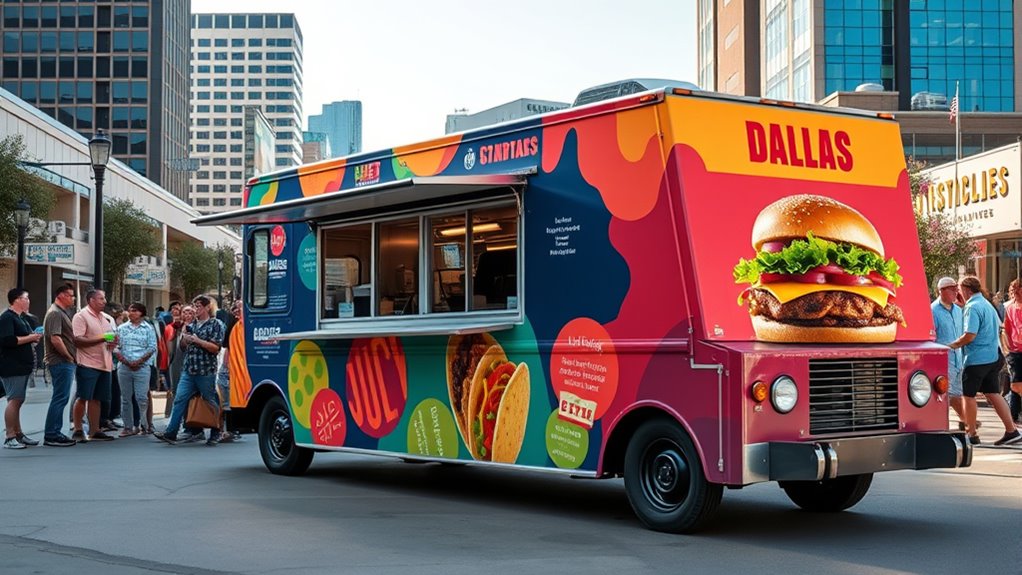
Building a strong brand for your food truck requires strategic marketing efforts that connect with your target audience and stand out in a competitive landscape. To boost visibility, leverage social media platforms—especially Facebook, which 75% of food trucks use to promote their business. Engaging campaigns can increase sales by 20% and raise average customer spending by 15%. Participate in festivals and community events, with 80% of trucks attending at least three annually, to foster direct connections and enhance local recognition. Additionally, use data analytics and digital tools to refine your marketing, achieving a 25% higher ROI and increasing repeat visits by 30%. Over 24,000 food trucks operate in the United States as of 2023, which underscores the importance of standing out through effective branding and targeted outreach. Focus on these strategies to build a memorable brand and attract loyal customers, while incorporating content relevance and authority to establish trust with your audience.
Frequently Asked Questions
How Long Does the Entire Dallas Food Truck Permit Process Typically Take?
You’re probably wondering how long it takes to get your Dallas food truck permit. Usually, the process takes about 4 to 8 weeks if your application is complete and all inspections go smoothly. Applying at least two months ahead helps avoid delays, especially since appointments and inspections can take time. Keep in mind, extra steps like fire safety or alcohol licensing can add to the timeline.
Are There Grants or Financial Assistance Options Available for New Mobile Food Vendors?
Imagine stepping into a world of opportunities where financial support helps your dreams flourish. You’ll find grants from local groups like The Dallas Foundation and North Texas Food Bank that focus on community impact. City programs, SBDC, and national grants also offer resources, including emergency aid and growth funding. While competition can be stiff, with proper planning and persistence, these options can help turn your mobile food venture into a thriving reality.
Can I Operate My Food Truck at Multiple Locations Without Additional Permits?
You can’t operate your food truck at multiple locations without additional permits. While a county-wide permit covers health inspections, you still need local permissions, zoning approvals, and possibly temporary permits for each site. Each location might require its own approval from property owners or event organizers. To stay compliant, plan ahead for the necessary permits and permissions, especially when moving between private property, public spaces, or special event zones.
What Are the Specific Health and Safety Training Requirements for Staff?
Did you know that 48 million Americans get sick from foodborne illnesses each year? You need to make sure your staff meets Texas health standards. All employees handling food must complete a DSHS-approved food handler course within 60 days of hire. Plus, at least one Certified Food Manager must oversee operations. These steps help prevent foodborne illnesses, keep your truck compliant, and pass health inspections with flying colors.
How Do I Find Approved Vending Zones and Partnership Opportunities in Dallas?
To find approved vending zones and partnership opportunities in Dallas, you should start by consulting Dallas City Hall’s Consumer Health and Code Compliance divisions for official maps and regulations. Attend local business or food vendor meetings, and network with property owners and event organizers. Reach out to the Dallas Park and Recreation Department for park concession opportunities. Building relationships with property owners and staying informed on city guidelines will help you locate suitable vending spots and partnerships.
Conclusion
Starting your food truck in Dallas is like planting a seed—careful planning and dedication will help it flourish. By steering permits, managing costs, and creating a standout menu, you’re building more than a business; you’re crafting a mobile culinary experience. With the right marketing, your truck will stand out in the bustling cityscape like a beacon of flavor and passion. Keep pushing forward—your food truck adventure is just beginning to roll.
